The art of displaying art
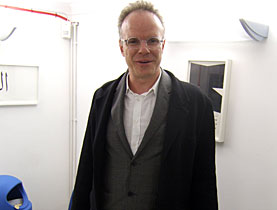
Swiss "super-curator" Hans Ulrich Obrist tells swissinfo.ch about inspiration, emerging art scenes – and holding exhibitions in his kitchen sink.
The 41-year-old co-director of exhibitions at the Serpentine Gallery in London recently took pole position in ArtReview magazine’s “power 100” list for 2009.
He was described as “one of the most active and well-networked figures the contemporary art world has seen”.
swissinfo.ch: You are the art world’s figurehead for 2009. It’s also the first time a curator, rather than an artist or museum director, has topped the annual list. Why do you think this was your year in the eyes of the jury?
Hans Ulrich Obrist: It’s difficult to answer why now, because obviously the activity of curating is something I have been doing for a long time and it’s something I do on a daily basis. But maybe it has something to do with the curator going beyond the museum.
Until 2000 I was a free, independent curator travelling approximately 300 days a year mapping out new art centres. The art world today is no longer solely in the West. We’ve got a real polyphony of art centres now in China, India, the Middle East. There are amazing art scenes in Latin America. That’s why it has been so important for me to map out this new geography of the art world. Maybe there is an interest in this notion of curating at large.
swissinfo.ch: You talk about these new centres of art, yet hardly any feature on ArtReview’s Power 100 list. It is still dominated by the US, Britain, Germany, France and of course Switzerland…
H.U.O.: These are historic processes which are a long-term phenomenon, not a sprint. When I started in the art world in the 1980s, Cologne and New York was where it was all happening. Then throughout the 1990s it was very important to work towards this polyphony of centres. It’s a process and it’s something to develop through the next decades.
swissinfo.ch: Do you feel pressure being at the top of this list?
H.U.O.: No, I’ll continue to do what I have always done: making exhibitions and writing books. There will be times when my activities are made very public and then times when I just get on with my field research. I can’t see anything changing.
But we should never forget that at the centre of the art world are the artists. The curators are just trying to help the artists in some kind of way. There would be no art world without the artists.
swissinfo.ch: You have said that “artists are the most important people in the world”. Why is that?
H.U.O.: When I was a teenager growing up in Switzerland, it was an amazing place to be for museums and exhibitions. For example I saw “Der Hang zum Gesamtkunstwerk” from [Swiss curator and art historian] Harald Szeemann which showed visions and utopias of artists from Gaudí and Rudolf Steiner to a reconstruction of Schwitters’ Merzbau about 30 times. That was my education. It inspired me.
Soon after that I started to meet artists. My early encounter with the Swiss artists Fischli/Weiss changed the way I think about art.
swissinfo.ch: Was this when you started to realise curating – showing the work of artists – was what you wanted to do?
H.U.O.: Absolutely, but I didn’t know where to start. Then in 1991 Fischli/Weiss and [French artist] Christian Boltanski suggested I do my first show in my kitchen in St Gallen, where I was at university. I never cooked – I’d even go out for a coffee.
So these artists took over the kitchen and made it into a place for art. They also brought food into the kitchen for the first time! There was a huge “Altar” from Fischli/Weiss. [German artist] Hans-Peter Feldmann exhibited in the fridge and [British artist] Richard Wentworth showed his work in the sink. He gave the exhibition its title, “World Soup”. It lasted three months and had 29 visitors, so it was a rather intimate exhibition.
All my early shows happened in Switzerland. After “World Soup” I did a show with Boltanski in a monastery library and then I curated a show with [German artist] Gerhard Richter in the Nietzsche Haus in Sils Maria. I was also very obsessed at that time with the visionary [Swiss] writer Robert Walser and the idea was to set up a little museum in the restaurant where he always took a break during his very long walks in Appenzell towards the end of his life.
It was out of these somehow very small exhibitions in strange locations in Switzerland that my first collaboration with large-scale museums started, in particular the Museum of Modern Art in Paris.
swissinfo.ch: As a curator, what is your responsibility to the consumer – the person who walks through the museum door?
H.U.O.: To do the best possible show at any given moment and to make it accessible to everyone. Gilbert and George once said “art for all”, which I still think is a wonderful expression and is at the core of what we’re doing here at the Serpentine Gallery, where we want exhibitions and architecture to be accessible. That’s also why admission is free.
Andrew Littlejohn in London, swissinfo.ch
Hans Ulrich Obrist was born in Zurich in May 1968. He became co-director of exhibitions and programmes and director of international projects at London’s Serpentine Gallery in April 2006, joining director Julia Peyton-Jones.
Prior to this he had been curator of the Musée d’Art Moderne de la Ville de Paris since 2000.
Obrist has curated and co-curated more than 200 solo and group exhibitions and biennales internationally since 1991.
The Serpentine Gallery Marathon series of public events was conceived by Obrist in 2006. The first in the series, the Interview Marathon in 2006, involved interviews with leading figures in contemporary culture over 24 hours, conducted by Obrist and architect Rem Koolhaas.
Recent publications include A Brief History of Curating (JPP Ringier); The Conversation Series, volumes 1-20 (Koenig); and Gerhard Richter Text (Koenig/Thames & Hudson).

In compliance with the JTI standards
More: SWI swissinfo.ch certified by the Journalism Trust Initiative

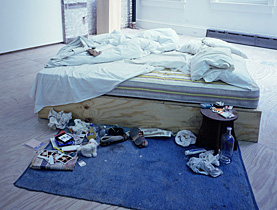
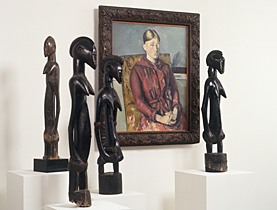

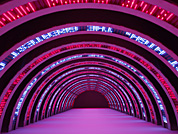
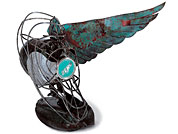
You can find an overview of ongoing debates with our journalists here. Please join us!
If you want to start a conversation about a topic raised in this article or want to report factual errors, email us at english@swissinfo.ch.